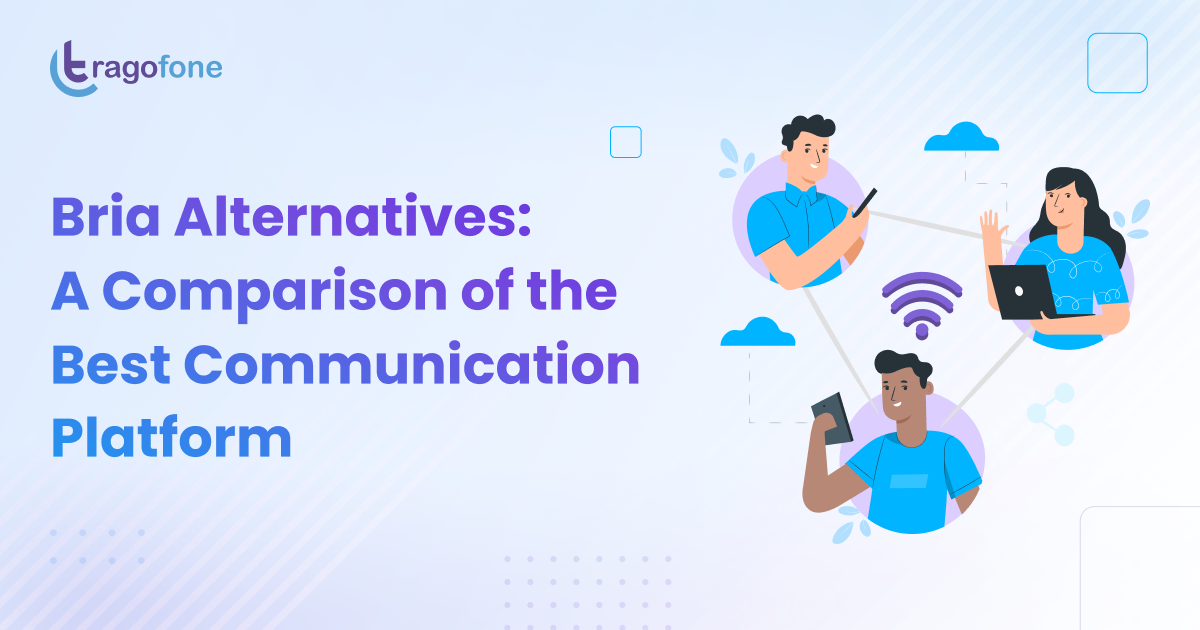
When businesses outgrow Bria Solo, they often begin the search for a more tailored softphone solution, one that offers better control, scalability, and support across devices. Bria Solo is known for its multi-platform SIP-based softphone capabilities.
But for many businesses, that’s just not enough anymore. Maybe you need a cloud softphone that supports push notifications. Maybe you are an enterprise seeking an affordable VoIP softphone with flexible pricing than Bria.
Or maybe you are simply looking for a Bria alternative that offers better value. This guide will break down 8 of the best Bria alternatives available today, covering their real-world use cases, platforms supported, VoIP features, security protocols, and pricing flexibility. Whether you are switching for cost, compatibility, or custom branding, the right VoIP app is here, and yes, it goes far beyond just a basic softphone.
Top Bria Alternatives at a Glance
| App Name |
Best For |
Standout Features |
Starting Price |
| Tragofone |
Enterprises & white-label VoIP providers |
Powered by WebRTC, a low-cost VoIP app, CRM/PBX integrations, white-labeling |
Custom pricing |
| Zoom Phone |
Hybrid teams using the Zoom ecosystem |
Native Zoom integration, HD audio, voicemail transcription |
Business Plus ($22.49) |
| Linphone |
Developers & open-source advocates |
Fully open-source SIP client, customizable UI |
Free |
| Zoiper |
Budget-conscious users needing multi-platform |
Secure VoIP, IAX support, one-time license option |
Free / $59.95 (one-time) |
| Cisco Jabber |
Large enterprises with Cisco infrastructure |
Cisco UC integration, secure instant messaging |
Custom pricing |
| Google Voice |
Small teams using Google Workspace |
Voicemail to email, call forwarding |
From $10/user/month |
| 8×8 Softphone |
Remote support teams & SMBs |
Global numbers, analytics dashboard, SMS support |
Custom pricing |
| Microsoft Teams Phone |
Enterprises using Microsoft 365 |
Teams/Outlook sync, PSTN connectivity, call queuing |
From $10/user/month |
8 Best Bria Alternatives and Competitors in 2025
Looking to replace Bria or upgrade your VoIP communication software? Here are eight reliable softphone solutions designed to enhance your business calling experience.
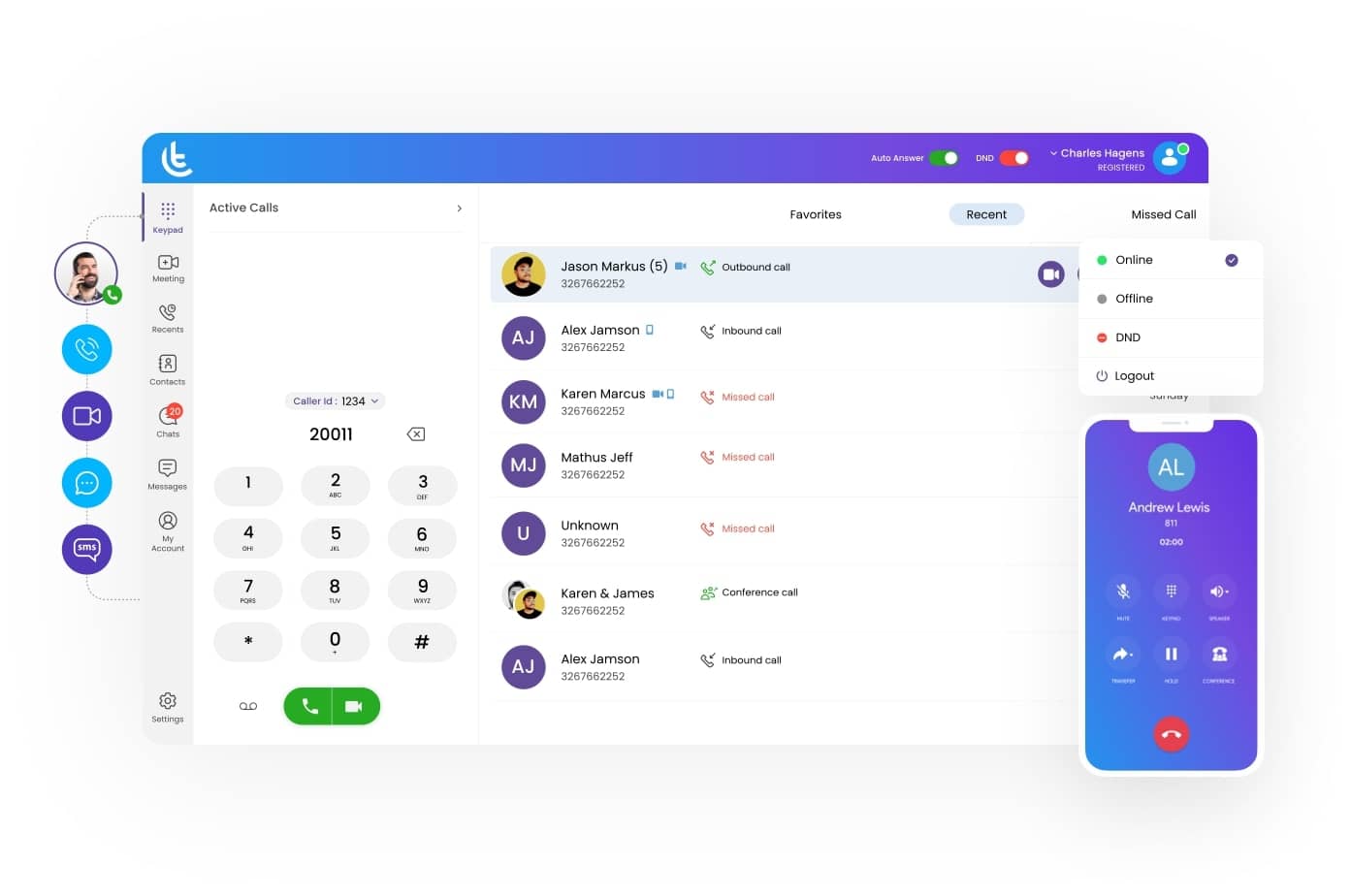
If you have ever struggled with Bria Solo’s limited branding control or manual provisioning, Tragofone directly addresses those enterprise-scale gaps. Tragofone is an advanced branded VoIP softphone designed for enterprises, ISPs, Telecos, MVNOs, VoIP service providers and SMBs seeking a white-label cloud-based calling app.
Unlike basic SIP dialers, it offers a full-stack softphone software solution with rich push notification support, auto-provisioning, and cross-platform deployment.
What Will You Like
- Use your logo, colors, and other branding elements. Ideal for launching your own VoIP app, even on app stores.
- Supports SIP and WebRTC protocols for secure, high-quality voice & video calling.
- Cloud provisioning allows instant setup without manual configuration.
- Push notifications for Android and iOS ensure zero missed calls.
- Integration with CRMs, IP-PBXs, and existing business phone systems.
- Offers native support for multi-device login, call transfer, and call hold.
- Full-featured admin dashboard for analytics and extension management.
- The softphone app is available on desktop and mobile devices across Windows, macOS, Linux, iOS, and Android.
- Tragofone’s WebRTC-based SIP softphone app ensures smooth operation on modern browsers (without installing any software or plug-ins), even with low-end devices and slow connections.
- Advanced security features with TLS and SRTP.
- Dedicated enterprise support with white-glove onboarding.
What You May Not Like
- Not available as a free plan.
- Not suitable for individual users. Only suitable for SMBs and enterprises.
Pricing
Contact sales teams for custom pricing based on the number of extensions.
Perfect For
Telecom providers, ISPs, or enterprises needing a white-label calling app. It also helps IT teams manage large, multi-device VoIP deployments via the cloud.
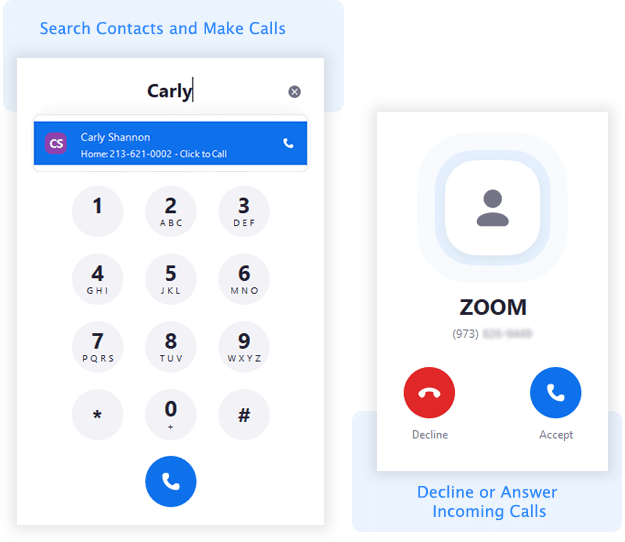
While Bria Solo focuses solely on SIP-based calling, Zoom Phone blends VoIP softphone functionality with the native experience of Zoom Meetings, Chat, and Team Presence. It also lets you set up call queues, global numbers, voicemail transcription, and more features that are only partially available in Bria’s advanced plans.
What Will You Like
- Integrated calling app within Zoom UI. No need for employees to learn a new softphone.
- Call routing for hybrid teams with auto-attendants, call queues, and global DID support.
- Multi-device ringing, voicemail transcription, and business SMS features.
- Works on Android, iOS, Windows, and Mac without configuration.
- No local SIP server setup required. Just enable it inside the Zoom admin.
What You May Not Like
- You can’t white-label the UI. Zoom Phone always carries Zoom’s native interface.
- Zoom Phone requires a consistent internet connection; offline access or local fallback for calling features does not exist.
Pricing
Provides Business Plus pricing model at $26.99/month/user.
Perfect For
Businesses already using Zoom Meetings, looking for a VoIP softphone within the same ecosystem. Remote teams that need call queues, extensions, and voicemail.

Unlike Bria Solo, which limits backend access and customization, Linphone is a fully open-source VoIP softphone that lets you control everything, from UI to SIP routing. It’s a developer-friendly calling app where you can self-host, integrate with your own SIP servers, or fork the code entirely to build a custom white-label dialer.
For organizations looking for Bria alternatives that don’t lock you into proprietary ecosystems, Linphone offers unmatched autonomy.
What Will You Like
- Truly open-source. Modify everything, from call flow to interface, under the GPL license.
- TLS, SRTP, and ZRTP for end-to-end SIP traffic protection.
- Cross-platform support. Consistent builds across Android, iOS, Windows, and Mac.
- No vendor lock-in. Bring your own SIP server, backend, and provisioning method.
- Ideal for MSPs or researchers needing a testable, forkable softphone architecture.
What You May Not Like
- Not ideal for non-technical teams. Lacks built-in admin UI or onboarding workflows.
- No hosted support or SLA unless you purchase their commercial SDK.
Pricing
Free under GPL license. Paid SDKs and commercial support are available via Belledonne Communications.
Perfect For
Security-conscious organizations, R&D teams, and open-source advocates who want to build their own cloud softphone experiences without recurring license fees.
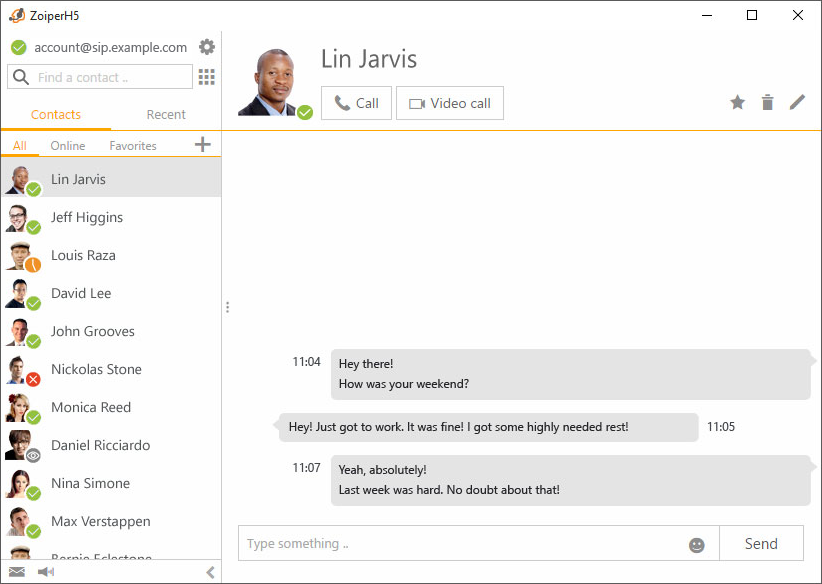
If subscription-based pricing or provisioning limits are what pushed you away from Bria Solo, then Zoiper may be the most flexible drop-in softphone app for your needs. Designed for VoIP users who need a no-fuss SIP dialer, Zoiper offers what many businesses want but rarely get: a one-time license model, no bloat, and wide backend compatibility.
What Will You Like
- A one-time license is available, which is ideal for cost-conscious businesses.
- Supports SIP and IAX protocol. Works with a wide range of VoIP backends and PBXs.
- Multi-platform compatible.
- Fast deployment. Small download size, simple provisioning, minimal setup time.
- Secure calling. TLS/SRTP is available in paid versions.
What You May Not Like
- Configuring features like SIP trunking, VPN, or DNS settings often requires advanced knowledge, leading to a steep learning curve for non-technical users.
- While Zoiper offers a free version, many essential features for businesses, such as video conferencing and call encryption, require a premium subscription.
- Even in Zoiper’s Pro version, the UI seems to be outdated than modern softphones.
Pricing
Free for the basic version. Zoiper 5 PRO starts at ~$59.95 (one-time license).
Perfect For
Businesses seeking a softphone that works across platforms without monthly costs. SMBs or IT support teams needing a secure yet low-overhead Bria replacement.
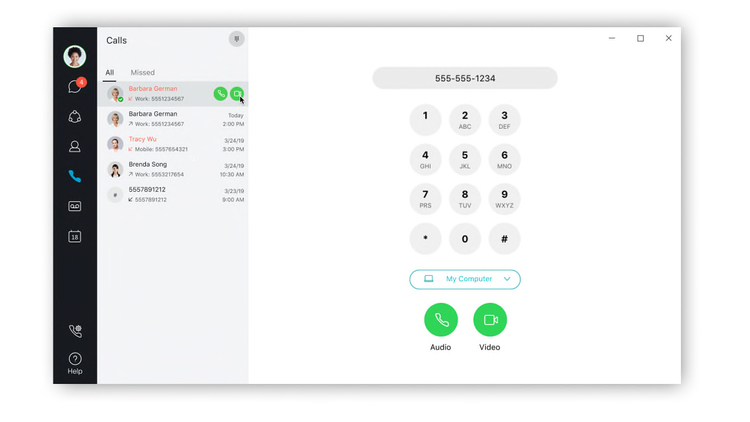
If your business is already built on Cisco infrastructure, like CUCM, Webex, or Cisco IP phones, then Cisco Jabber is more than a Bria alternative. It’s an integrated softphone that connects directly with your company’s existing Cisco backend, eliminating the friction of third-party SIP configuration.
Jabber is ideal for large teams managing internal and external VoIP traffic, unified messaging, and remote communication, without leaving the Cisco ecosystem.
What Will You Like
- Native connection to Cisco Unified Communications Manager and IP phones.
- Secure SIP communication with enterprise-grade encryption (TLS/SRTP).
- Switch between devices with synced presence.
- Internal chat and file share reduce the need for apps like Slack alongside Bria.
- Supports video, voice, voicemail, and conferencing.
What You May Not Like
- Requires an existing Cisco backend (like CUCM) to function.
- Limited customization options compared to white-label cloud softphone apps like Tragofone.
Pricing
Part of Cisco enterprise UC licensing; no standalone softphone price listing.
Perfect For
IT departments managing call routing, extensions, and voicemail centrally via Cisco UCM.
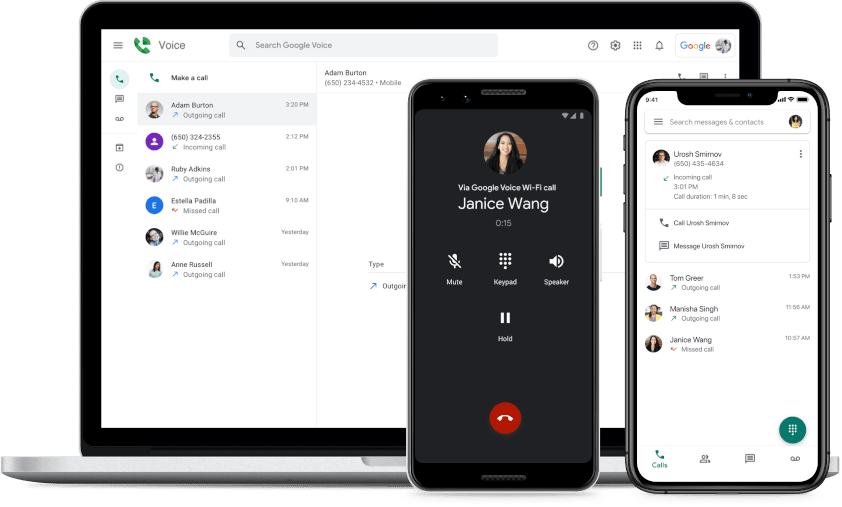
If your business is small and already inside Google Workspace, Google Voice offers a light, cost-effective Bria alternative that removes all the friction of configuring a SIP dialer. Calls can be placed from the Gmail sidebar, the Google Voice mobile app, or the web dashboard.
It supports voicemail transcription, call forwarding, and number porting, making it one of the most user-friendly Bria alternatives for early-stage teams or remote-first startups.
What Will You Like
- No PBX or SIP configuration. Voice is enabled directly via the Google Admin Console.
- Android, iOS, Windows, Mac, and browser support without provisioning steps.
- Sync Gmail and Calendar to avoid missed call alerts and voicemails.
- Voicemails are converted into text for quick triaging without third-party plugins.
- Call quality and uptime are strong within the Google backbone.
What You May Not Like
- No support for custom SIP servers as it does not expose SIP credentials for external use. Thus, prohibiting the features of a traditional SIP dialer.
- No control over codecs, transport layers, or call routing rules.
- Limited availability. Not accessible in major markets like India.
Pricing
Starts at $10/user/month with a Google Workspace account.
Perfect For
For startups, lean teams, or remote-first companies, it’s a “just works” solution without the operational overhead.
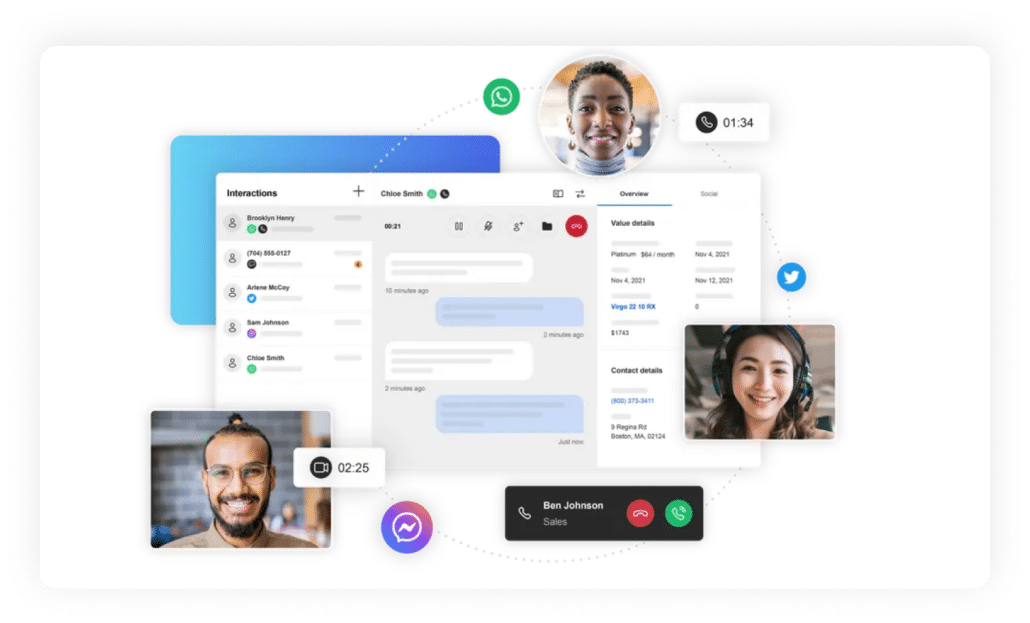
8×8 Softphone delivers an all-in-one cloud softphone experience, complete with call analytics, team presence, global numbers, and business messaging. It’s designed for SMBs and support teams that need more than just a dialer; they need a platform that supports internal operations and customer communication at scale.
What sets it apart from other softphones is its contact center-grade visibility. You get real-time call quality monitoring, agent activity dashboards, and even speech analytics.
What Will You Like
- Easily assign local and toll-free numbers in 40+ countries.
- Visual dashboards for usage, quality, and user behavior.
- Reduces the need for separate tools alongside your VoIP softphone.
- Built on WebRTC and SIP for performance across desktop and mobile, but protocol selection is handled behind the scenes
- Desktop and mobile calling apps behave consistently across devices.
What You May Not Like
- 8×8 operates as a fully hosted VoIP service, meaning you can’t bring your own SIP server or customize the SIP backend.
- Slight learning curve due to the depth of analytics and routing rules.
Pricing
Custom pricing
Perfect For
Support teams or SMBs needing real-time insights beyond basic SIP dialers like Bria. Businesses that operate internationally and need local number access with analytics.
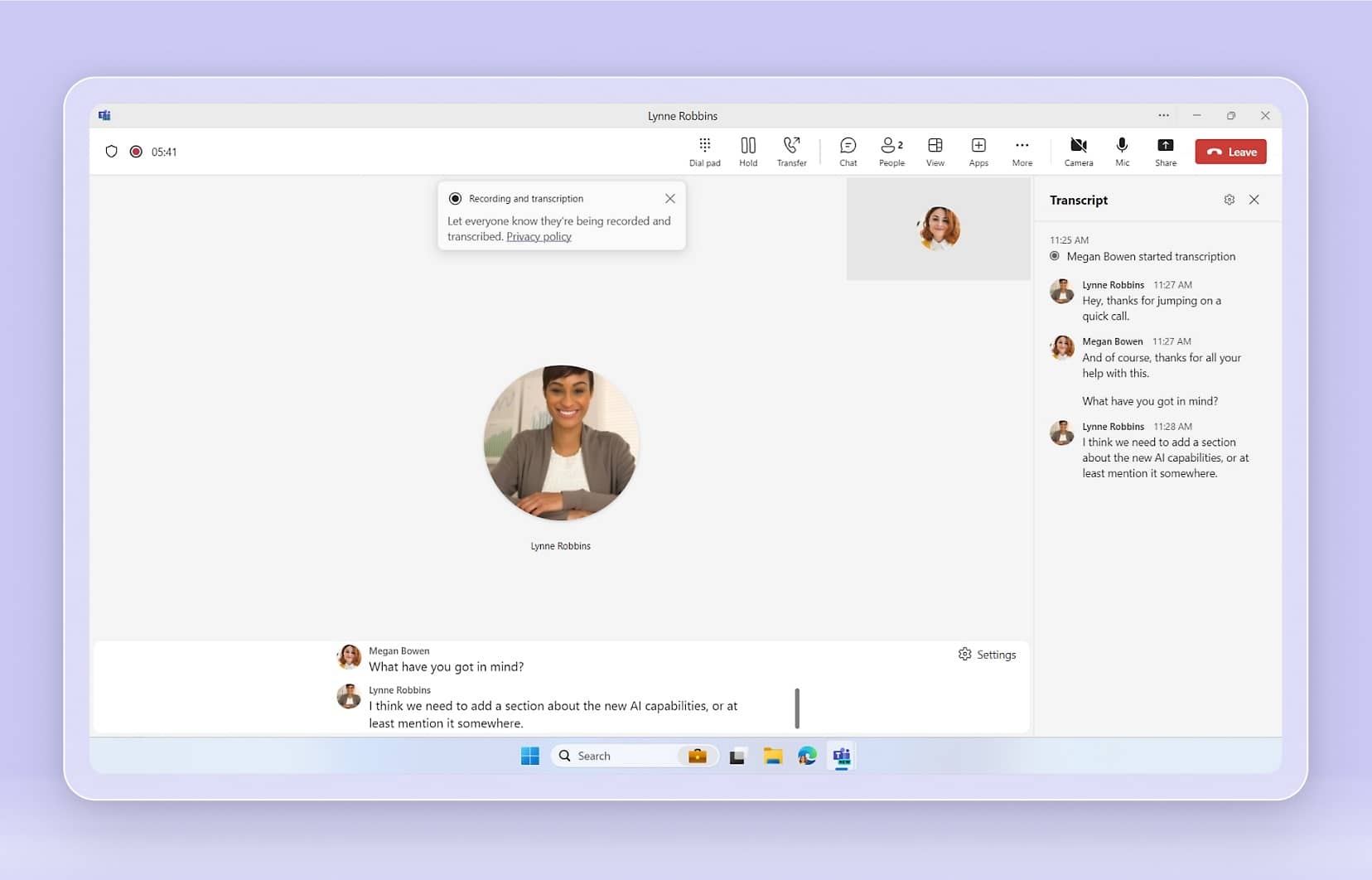
If your company runs on Microsoft 365, Microsoft Teams Phone offers a natural evolution from Bria Solo. Where Bria requires third-party SIP provisioning and lacks proper integration with enterprise tools, Teams Phone unifies VoIP softphone functionality with chat, calendaring, document sharing, and enterprise presence, all inside the Teams interface.
Teams Phone can route calls using Microsoft’s cloud PBX or your own SIP trunk via Direct Routing. It offers call queues, auto-attendants, PSTN connectivity, voicemail transcription, and more, while tightly integrating with Outlook, SharePoint, and OneDrive.
What Will You Like
- Direct PSTN integration via Microsoft or your own SIP trunk. No new softphone needed.
- Calling, chat, calendar, and docs replace Bria + extra apps in one place.
- Native integration with Outlook and Microsoft 365: Schedule, call, and follow up from the same UI.
- Calls can hand off between devices with live status updates.
What You May Not Like
- It requires a Microsoft 365 base license + a calling plan or direct routing.
- Not suited for businesses outside the Microsoft ecosystem.
Pricing
Starts at $10/month as an add-on to Microsoft 365. PSTN calling plans are priced separately.
Perfect For
Enterprises that want VoIP calling apps integrated into their Microsoft stack. Internal IT teams manage call flow, extensions, and contact syncing inside Microsoft Teams.
Choose the Right Bria Alternative for You
Not all Bria alternatives are built the same, and that’s precisely the point. Whether you’re looking for a white-label VoIP softphone like Tragofone, a plug-and-play cloud calling app like Google Voice, or an enterprise solution integrated with Microsoft Teams or Cisco Jabber, the best Bria replacement depends on your infrastructure, team size, and business goals.
Use this guide to filter your options by platform compatibility (Android, iOS, Windows, Mac), SIP control, branding needs, or deployment scale. No matter your business size, a VoIP calling app here does more than what Bria Solo offers, without forcing you into a single vendor path.
FAQs About the Best Alternatives to Bria Softphone
- What are the main reasons businesses look for alternatives to Bria?Businesses often look for alternatives to Bria when they need more than just a SIP dialer. Key reasons include the higher price range (~$4), limited support for push notifications, no one-click integrations, manual provisioning at scale, and minimal analytics features. Many also seek a cloud softphone with deeper mobile compatibility or unified team communication features.
- Which Bria alternatives offer the best call quality and reliability for business VoIP needs?Tragofone, Cisco Jabber, and Microsoft Teams Phone stand out for enterprise-grade audio, SIP-level security, and infrastructure-backed reliability. All three are designed for consistent, multi-device VoIP performance and business interaction continuity.
- Are there Bria alternatives with more affordable pricing for businesses?Yes. Tragofone offers customized pricing tailored to your deployment size, making it ideal for scaling teams. Zoiper also provides a one-time license option, which is more budget-friendly than Bria’s recurring plans.
- Can Bria alternatives integrate with existing business tools and workflows?Absolutely. Zoom Phone integrates with Zoom’s ecosystem and supports apps like Salesforce and Google Workspace, while Microsoft Teams Phone connects with Outlook, SharePoint, and OneDrive. Tragofone can integrate with CRMs, PBXs, and contact center tools, Microsoft Teams, Zoom, and other business apps through API or backend provisioning.
- Which Bria alternative is the best for enterprises?Tragofone offers businesses more than standard VoIP services at a per-user cost below $1, whereas Bria has a free trial starting from ~$3/month. So, for teams focused on scalability and customization, Tragofone delivers greater value at a lower total cost of ownership.
- Are there open-source Bria alternatives?Yes. Linphone is a fully open-source software under the GPL license. It gives you full control over SIP logic, UI, security, and device support, making it ideal for developers or tech-forward businesses.
- What is the biggest difference between Tragofone and Bria Solo?The most significant difference is that Tragofone is built for SMBs & enterprises needing a white-label, cloud softphone with push notifications and CRM/PBX integration, starting at under $1/user/month. Whereas, Bria Solo is a consumer & business facing softphone that starts around $4/month.